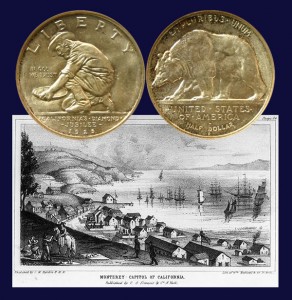Today, the California Diamond Jubilee Commemorative Silver Half Dollar Coin remembers the beginning of the California Constitutional Convention of 1849 and the feelings of the citizens to the United States in the preceding years.
On June 3, 1849, Governor Riley proclaimed that delegates should be chosen to convene and form a State Constitution.
On September 1, 1849, the first delegates met in Colton Hall in the town of Monterey at 12 pm with ten men present.
The men chose a Chairman, pro tempore, and a Secretary, pro tempore, however without a quorum, the group adjourned to meet again on Monday, September 3, 1849 at noon.
In his book, Three Years in California, Reverend Walter Colton, U.S.N., provided insight into the California prior to statehood discussions.
=====
A few words will place within the clear comprehension of the reader, the posture of public affairs in California at the time my journal opens.
The U. S. flag was raised at Monterey and San Francisco on the 10th of July, 1846.
This event was wholly unexpected by the Californians, and struck the public heart with the deepest surprise; other causes of alarm and apprehension faded into shadow in the presence of this decisive measure; they were the admonitory vibrations, but here was the earthquake itself.
The people were more astounded than indignant, and quite as intent over problems of preservation as measures of resistance.
At a public meeting held at Monterey, in which the patriotism, talents, and sagacity of the country were largely represented, the question of throwing the territory under the protection of England, through the naval forces commanded by Admiral Seymour, who was on the coast at the time, was excitingly discussed.
But this proposition received its quietus under the successful raillery of Don Raphael, of Monterey.
“Our object,” said this witty counselor, ” is to preserve our country; but she is gone, — California is lost to us: and this proposal to invoke the protection of England, is only to seek another owner.
“The redress is worthy of the market-woman: a dog had robbed her hamper of a leg of mutton, and she sent another dog more powerful after him to get it away; when asked what good that would do her, she replied, it would be some satisfaction to see the first dog deprived of the stolen leg.
“And so it is with us; the mutton is gone, and a choice of the dog only remains: others may prefer the bull-dog, but I prefer the regular hound; he has outstripped the other in the chase, and so let him have the game.”
The convention broke up without adopting any decisive measures; leaving each one to act as his impulses or convictions of duty suggested.
The military forces of the country were at this time under the command of General Jose Castro, an officer of high pretensions, but utterly deficient in strength and steadiness of purpose, and that capacity which can work out important results with slender and inapposite means.
His followers had gathered to him with as little discipline, sobriety, and order, as would characterize a bear-hunt.
Their prime impulse lay in the excitement which the camp presented. It was the same thing to them whether their weapon was a rifle or a guitar, — whether they were going to a skirmish or a fandango.
With six or eight hundred of these waltzing warriors General Castro was now on his march into the southern department, with the evident purpose of taking up his position near the Pueblo de los Angeles.
Such was the posture of affairs when Commander Stockton resolved to rest in no half-way measures. The wave had been set in motion and must roll on, or its returning force might sweep him and his temporary garrisons into the Pacific.
And yet aggressive measures in the present condition of the squadron seemed to border on rashness.
The Portsmouth, under Commander Montgomery, must be left at San Francisco to garrison the posts occupied by the flag; the Savannah, commanded by Captain Mervin, must remain here to hold Monterey; the Warren, under Commander Hull, was at Mazatlan; only the Congress, Lieutenant Livingston commanding, and the Cyane, under Commander Du Pont, remained.
With the crews of these, and a hundred and sixty men under Colonel Fremont, California was to be conquered and held, and this too in the presence or defeat of a military force that had the entire resources of the country at their command.
But a gallant purpose will often achieve what a questioning prudence would relinquish.
The mountain torrent, with its impetuosity, sweeps away the barrier which effectually obstructs the level stream.
=====
The California Diamond Jubilee Commemorative Silver Half Dollar Coin shows against a view of Monterey, Capitol of California, circa 1849.
